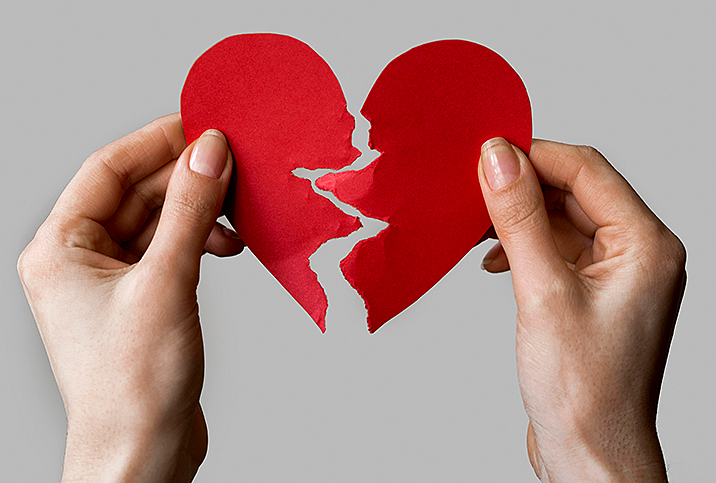When Is the Right Time to Break Up With Someone Who Has Depression?

I knew my then-partner suffered from depression when we first started dating. In some ways, my knowing helped make him feel safe and secure. One of the things that made him fall in love with me was how calm I remained during his episodes. It was as if all of those years of living with my bipolar mother prepared me for this relationship.
But after about two years as a couple, in which I uprooted my life to move across the country to stay together, I realized it wasn't working. This relationship was taking a huge toll on me and my own mental health. I was becoming a shell of my former myself.
I had to get out but had no idea where to even start. I was his best friend, his only friend. I couldn't abandon him at his worst. He needed me. Who would help him if I left?
Time to break up
"One of the biggest signs a relationship with a partner who has depression has run its course is when they are not willing to attempt to get better. Of course, this can also be a symptom of depression itself. But a lack of drive to get treatment of any sort does not foreshadow a healthy relationship," said Jennifer Klesman, L.C.S.W., a Chicago-based licensed clinical social worker, therapist and author of "You Can't Stay There: Surviving a Breakup One Moment at a Time."
"If the relationship is only existing to support the other person, then it isn't actually serving both parties, especially if you feel like your needs aren't being met in the relationship or that your feelings are invalidated because they 'aren't as bad,'" Klesman added. "Or if you're putting your needs over your partner's."
"No one wants resentment to build or for a relationship to continue that is no longer healthy for either person," said Abbey Sangmeister, L.P.C., a licensed professional counselor and the founder of Evolving Whole in Ocean City, New Jersey. "Your role is to be supportive and encouraging but not to fix them. That is their job."
The right time
While the signs that it's time to get out of a relationship can come after exhausting all ways to make it work, finding the exact moment to have this conversation can be tricky.
"Do not wait until you are in an argument to break up with someone who has depression, as this can heighten any negative emotions into more severe behavior," said Jaclyn Gulotta, Ph.D., a licensed mental health counselor and a qualified mental health supervisor in the Orlando area.
Rather, have a talk before a therapy session or a scheduled visit with a friend or family member.
"The worst time to break up with a depressed partner is when they're likely to be alone or isolated," said Carrie Covell, L.C.S.W., a psychotherapist and licensed clinical social worker in West Hollywood, California, but also practicing in New York.
"You can also try to choose a time when your partner is in a stable state of mind and not experiencing a depressive episode. This can help minimize the risk of exacerbating their symptoms and ensure that they are better able to cope with the breakup," said Martha Tara Lee, D.H.S., a relationship counselor and clinical sexologist with Eros Coaching in Singapore.
Breakups should never be over a text message, especially when you're breaking up with someone who has depression.
Avoid mixed messages
"Be honest and direct with your partner about your feelings, but also be sensitive to their emotional state," Lee said. "Avoid blaming or criticizing them for their depression, as this can further worsen their symptoms."
It's also important to set boundaries and keep them after the split, Klesman noted.
"You should be clear and communicative after the breakup about what you're doing. For example, express the need for no contact for a period of time (typically 30 days) for both of you to start healing," she said. "You should not offer a closure conversation. This can often spiral into numerous talks because no one conversation will give them closure that will feel 'good enough.'"
You want to try to make sure your breakup conversation doesn't feel like it's blindsiding your partner, which is why throughout the relationship "you should communicate feelings, problems and concerns as they are happening," explained Morgan Hannaleck, A.S.W., an associate clinical social worker and the San Diego-based California regional director at Minding Your Mind.
"Breakups are typically thought-out decisions," she said. "A lack of communication prior to a breakup can leave the other person feeling incredibly blindsided. If they struggle with depression, this may cause them to blame themselves as they also typically struggle with self-esteem and feelings of worthiness."
Make sure they have a support system that isn't just you
My own breakup with my former partner was not handled in the right way. My biggest regret is not ensuring he had a support system in place after the breakup.
"Once you break up, you can no longer be a source of support for your ex, who may believe you to be what they need to feel better since the breakup and grief will feel worse on top of their depression," Klesman said. "This often looks like no contact and is for your sake and theirs. You need to pass the torch of responsibility to someone else. You should reach out to any friends and family that may need to know that your partner will need more support than usual."
If you have safety concerns about your partner's severe depression or suicidal ideation you should prioritize their safety and seek professional help before ending the relationship, Lee stressed.
Can you help someone who doesn't want to be helped?
Deciding when or how to break up with your partner who has depression is not an easy decision. I wish I had more advice when we went our separate ways.
"Remind yourself that you can't cure them," Klesman said. "The depression was never your responsibility to cure or heal."
"Ultimately, the decision to break up with a partner who has depression is a personal one that should be made based on your own needs and well-being," Lee said. "It's important to prioritize your own mental health and seek support from friends, family or a therapist if needed."


















